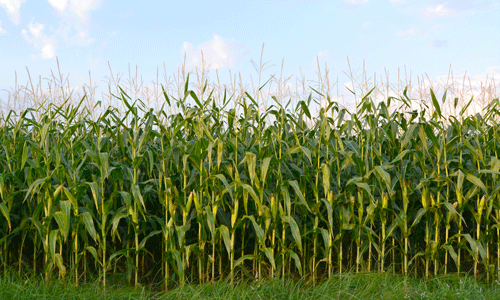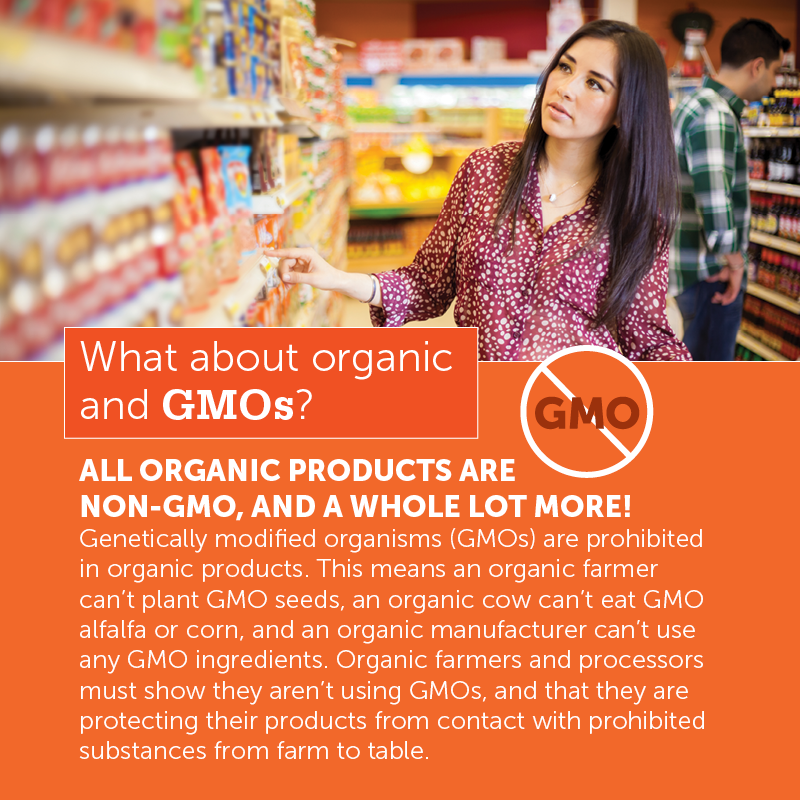 The use of genetically modified organisms (GMOs) is prohibited in organic products. This means an organic farmer can’t plant GMO seeds, an organic cow can’t eat GMO alfalfa or corn, and an organic soup producer can’t use any GMO ingredients.
The use of genetically modified organisms (GMOs) is prohibited in organic products. This means an organic farmer can’t plant GMO seeds, an organic cow can’t eat GMO alfalfa or corn, and an organic soup producer can’t use any GMO ingredients.
To meet the USDA organic regulations, farmers and processors must show they aren’t using GMOs, and that they are protecting their products from contact with prohibited substances, such as GMOs, from farm to table.
What are GMOs?
- You’ve probably heard about GMOs, which are also referred to as genetically modified organisms, GE (genetically engineered), herbicide-tolerant (HT) or Bt crops. In simple terms, a GMO is an organism that has been changed by injecting it with genetic material from another species.
- From The Organic Center’s GE report: GE seeds were introduced commercially in 1996 and now dominate the production of corn, soybeans, and cotton in the United States. GE crops contain one or both of two major categories of traits:
- Herbicide-tolerant (HT) crops, more commonly known as "Roundup Ready crops," are genetically engineered to survive direct application of one or more herbicides during the growing season, chemicals that would otherwise kill or severely stunt the crop.
- Bt crops are engineered to produce toxins...that kill certain agricultural insect pests.
- The U.S. Department of Agriculture’s (USDA’s) National Organic Program (NOP) regulations prohibit the use of “excluded methods” during the production or handling of any organic product. Excluded methods are defined in the regulation as “a variety of methods used to genetically modify organisms or influence their growth and development by means that are not possible under natural conditions or processes, and are not considered compatible with organic production.” (7 CFR 205.1)
- Under USDA’s NOP, excluded methods do not include traditional plant breeding, conjugation, fermentation, hybridization, in vitro fertilization, or tissue culture.
- Since the release of the organic regulations in 2002, “excluded methods” have been referred to as genetic engineering (GE) or genetically modified organisms (GMOs).
What is the best GMO claim to make on certified oraganic product labels?
- Organic certification and “certified organic” statements are sufficient to substantiate a claim that a certified organic food is non-GMO and/or was not produced using excluded methods. However, many operators choose to make additional non-GMO claims.
- The phrase “non-GMO,” when used on NOP-certified product labels, is understood to mean that the product was produced without the use of genetic engineering. This is consistent with the organic regulations.
- “Non-GMO” is an accurate statement because it declares a product is produced without the use of GMOs. Unlike the term “GMO-free,” the term “non-GMO” does not claim that the product is 100% free of GMOs.
How does the organic certification process verify that products are non-GMO?
- The use of GMOs is prohibited during the production and processing of certified organic products. A rigorous certification process, including periodic testing, is required.
- The prohibition on GMOs extends to all organic label categories (“100% Organic,” “Organic,” and “Made with Organic”) and all ingredients (organic and non-organic, including minor ingredients such as flavors, yeast and corn starch) contained in the products.
- NOP-certified organic farmers must not use genetically modified seed, and they must have procedures in place that prevent GMO drift from adjacent farms.
- NOP-certified processors must have practices in place to separate organic ingredients and products from non-organic (potentially GMO) farms during receiving, processing, storage and shipping.
- Certified operations are inspected at least once a year by a third-party USDA-accredited certifying agent. The inspection process is designed to determine whether the certified operator is complying with the organic regulations. This includes verifying whether the certified operator is adequately preventing contact with GMOs. If GMOs are suspected or detected, certifiers are required by law to conduct an investigation to determine if a violation of organic farming or processing standards occurred.
- The organic status of an operation would be affected if the presence of GMOs was intentional, or if it was the result of inadequate prevention measures. Under the enforcement authority of USDA, any certified organic operation found to use GMOs may face enforcement actions, including loss of certification and financial penalties.
Testing under the organic standards verifies the non-GMO status of organic products.
- Certifying agents conduct residue testing to determine if prevention practices are adequate to avoid contact with prohibited substances such as pesticides, antibiotics, and GMOs.
- Testing is conducted as part of required periodic testing established in the law and regulations. It is also conducted when contact with GMOs is suspected, or when a certifier or NOP receives a complaint.
- Testing is used to determine whether certified operators have adequate GMO avoidance measures in place. Certifiers must issue non-compliance notices to organic operations that fail to take adequate measures to avoid contact with GMOs. Failure to correct non-compliances may result in loss of certification.
Other benefits of buying organic.
- The organic regulations require certified operators to build healthy soils and promote biodiversity and environmental stewardship.
- Buying organic foods promotes public health and the health of the environment because in addition to the prohibition of GMOs, the use of toxic and pervasive pesticides and petroleum-based fertilizers is not allowed.
- Animals raised organically must not be treated with antibiotics, growth hormones, or other artificial drugs.
- Some studies show that organic foods have more beneficial nutrients, such as antioxidants, than their conventionally grown counterparts.
- Processed organic products are produced under strict certification standards, and must not contain artificial preservatives, colorings, or flavor. Ionizing radiation is prohibited.

OTA’s GMO White Paper OTA's Fact Sheet on Non-GMO Verification under NOP Organic Certification OTA's Q & As on Non-Non-GMO Verification under NOP Organic Certification Quick Tips: Organic is THE CHOICE to avoid GMOs
